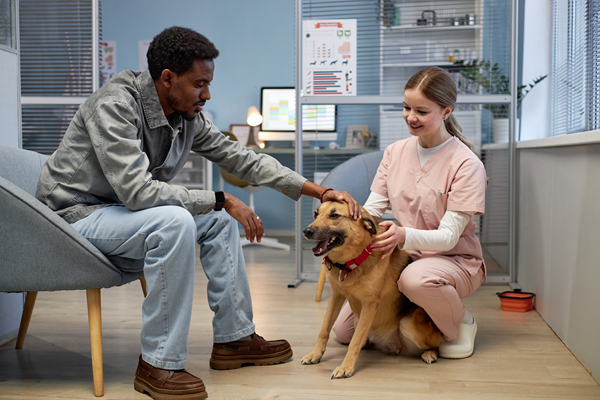
Veterinary technicians (vet techs) are an important part of keeping a clinic running, and yet so much of what they do flies under the radar. It is essential work that often goes unnoticed.
In honor of Vet Tech Week (or Vet Tech Month, if you live in Canada), here are 10 things veterinary technicians do that most people don’t even notice – but absolutely should.
1. They’re the real-life medical translators
Vet techs are fluent in two languages: doctor-speak and anxious pet-parent. They can be the bridge between medical jargon and real-world understanding.
2. They draw blood like the pros they are
Ever watched a tech find a vein on a fluffy, wiggly kitten? It’s part science, part magic. Vet techs are trained in venipuncture (the art of drawing blood) and can do it safely on everything from a tiny chihuahua to a thousand-pound horse with precision and patience.
3. They’re anesthetists in all but name
A credentialled technician is one of the most important parts of safe anesthesia – if not the most important part. Their expertise in medications, monitoring your pet’s vitals, and adjusting oxygen or medication to make sure that your pet stays safe under anesthesia is essential.
4. They notice what you don’t
Technicians see a lot of pets every day and can catch subtle problems, including a limp you may not have noticed, gums that are a bit paler than normal, or a pain response in a cat that “seems normal at home.” That quiet attention can save lives.
5. They’re emotional support for humans, too
You know that moment when you receive bad news about your pet and the world seems to stop? Your vet tech is probably right there with you, worrying about you and your pet long after the appointment ends and wanting to help you through it.
6. They’re professional cat and dog whisperers
There’s no single way to handle an animal under stress, but somehow techs figure it out – a calming voice, a towel wrap, a trick with peanut butter, or just the right kind of patience.
Reading body language, adjusting touch, and building trust in moments when an animal is scared or hurting is essential to good patient care.
7. They handle the messy stuff without complaint
Techs are often the ones cleaning up what nobody else wants to touch. Bodily fluids, anxious accidents, fur explosions, anal gland surprises – it’s all in a day’s work. And they do it with a shrug and a joke, because they care more about the patient than the mess.
8. They keep the clinic running (and stocked)
Behind the scenes, techs may manage inventory, track controlled drugs, sterilize instruments, calibrate machines, and make sure samples get to the lab for testing.
9. They keep learning, always
Becoming a credentialed veterinary technician isn’t a side gig or a weekend certification. It’s a career built on serious education and a lot of hard work.
Most credentialed vet techs complete a two- to four-year accredited veterinary technology program that includes classes on anatomy, physiology, pharmacology, microbiology, radiology, anesthesia, and countless hours of hands-on clinical practice.
After that comes a comprehensive exam to ensure their competence across all areas of veterinary medicine: the Veterinary Technician National Exam (VTNE). Passing that exam earns them the title of credentialed veterinary technician, which might appear as LVT (Licensed Veterinary Technician), CVT (Certified Veterinary Technician), or RVT (Registered Veterinary Technician), depending on the state or province.
To maintain that credential, most states and provinces require a minimum amount of continuing education (CE) to stay current on everything from pain management to new anesthesia techniques. Techs are constantly learning, evolving, and deepening their expertise for your pet’s healthcare.
10. They do it for love, not glory
Vet techs don’t work for money or fame. The hours are long, the work is tough, and the emotional load is real.
They stay because they can’t imagine doing anything else. Because they believe every animal deserves comfort, dignity, and care – and they’ll do whatever it takes to provide it.
They’re the heartbeat of every veterinary clinic, often unseen but always essential.
A Final Word of Thanks
If you’re reading this during National Veterinary Technician Week/Month, take a minute to thank the techs in your life – not just with words, but with recognition.
Appreciate the gentleness behind their skill and listen actively when they’re discussing your pet with you. They’re trying to help you help them.
And if you’re one of those incredible humans in scrubs: thank you. You make the world better for pets and people alike, every single day.
